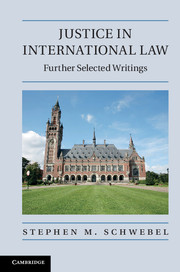Book contents
- Frontmatter
- Contents
- PART I International Court of Justice
- 1 Reflections on international adjudication
- 2 The impact of the International Court of Justice
- 3 The politics of adjudication
- 4 National judges and judges ad hoc of the International Court of Justice
- 5 The roles of the Security Council and the International Court of Justice in the application of international humanitarian law
- 6 The inter-active influence of the International Court of Justice and the International Law Commission
- 7 A site visit of the World Court
- 8 The proliferation of international tribunals: threat or promise?
- 9 The Gulf of Maine maritime boundary delimitation: the constitution of the chamber
- 10 The judgment of the International Court of Justice in the case concerning the Gabčíkovo-Nagymaros Project (Hungary/Slovakia)
- 11 Gorbachev embraces compulsory jurisdiction
- PART II International arbitration
- PART III Miscellaneous
- Collected publications, judicial opinions and book reviews
- Index
10 - The judgment of the International Court of Justice in the case concerning the Gabčíkovo-Nagymaros Project (Hungary/Slovakia)
from PART I - International Court of Justice
Published online by Cambridge University Press: 07 September 2011
- Frontmatter
- Contents
- PART I International Court of Justice
- 1 Reflections on international adjudication
- 2 The impact of the International Court of Justice
- 3 The politics of adjudication
- 4 National judges and judges ad hoc of the International Court of Justice
- 5 The roles of the Security Council and the International Court of Justice in the application of international humanitarian law
- 6 The inter-active influence of the International Court of Justice and the International Law Commission
- 7 A site visit of the World Court
- 8 The proliferation of international tribunals: threat or promise?
- 9 The Gulf of Maine maritime boundary delimitation: the constitution of the chamber
- 10 The judgment of the International Court of Justice in the case concerning the Gabčíkovo-Nagymaros Project (Hungary/Slovakia)
- 11 Gorbachev embraces compulsory jurisdiction
- PART II International arbitration
- PART III Miscellaneous
- Collected publications, judicial opinions and book reviews
- Index
Summary
When asked to prepare this paper about the judgment of the International Court of Justice in the case concerning the Gabčíkovo-Nagymaros Project (the Project) as an element of practice in the settlement of international water disputes, I replied that the questions put to the Court by the parties in that case, and the Court's answers to those questions, involved more than disposition of a water dispute. Nevertheless the case is of interest to the present proceedings.
Background of the case
In 1977, the Hungarian People's Republic and the Czechoslovak People's Republic concluded a treaty (the 1977 Treaty) for the construction and operation of a system of Danube River locks as a “joint investment.” That investment was essentially aimed at the production of hydroelectricity, the improvement of navigation in that section of the Danube, and the protection of areas along the banks against flooding. The parties at the same time undertook to ensure that the quality of water in the Danube was not impaired as a result of the Project, and that obligations for the protection of nature arising in connection with the construction and operation of the system of locks would be observed. Navigational and fishing interests were also to be protected.
- Type
- Chapter
- Information
- Justice in International LawFurther Selected Writings, pp. 113 - 123Publisher: Cambridge University PressPrint publication year: 2011
- 9
- Cited by



